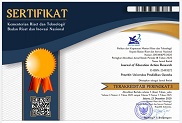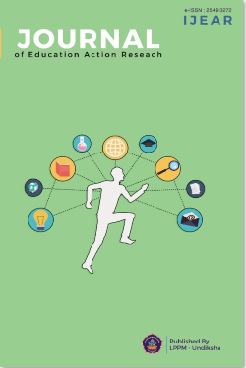Index Card Match Learning Model with Cooperative Setting Think Pair Share Type Improves Early Mathematics Skills and Cooperation of Early Age Children
DOI:
https://doi.org/10.23887/jear.v8i3.84516Keywords:
Learning Model, Index Card Match, Think Pair Share, Early Math Skills, CooperationAbstract
Early mathematics and cooperative attitudes. Based on this, this study aims to analyze the effect of the index card match learning model with a cooperative setting of the think pair share type in improving early mathematics and cooperation skills in early childhood. This study is quasi-experimental with a non-equivalent post-test-only control group design. The population in this study were 184 children of Kindergarten B1. The sample selection technique used in this study was simple random sampling. The number of participants in this study was 46 children from kindergarten B. The method used in collecting data was a questionnaire. The instrument used in collecting data was a questionnaire sheet. The data analysis technique in this study was inferential statistics. The study results showed differences in the mathematics and cooperation skills of children who followed the Index Card Match learning model with a cooperative setting of the Think Pair Share type with children compared to those taught using the conventional model in Kindergarten B. It was concluded that the Index Card Match learning model with a cooperative setting of the Think Pair Share type can improve early mathematics and cooperation skills in early childhood. The research implies that using the Index Card Match learning model with a cooperative setting of the Think Pair Share type provides an exciting experience that teachers can use to create meaningful learning activities.
References
Agung, A. A. G. (2013). Evaluasi Pendidikan. FIP Undiksha.
Anggreni, P. F., Asri, I. A. S., & Ganing, N. N. (2017). Pengaruh Model Pembelajaran Kooperatif Tipe Think- Pair-Share ( Tps ) Berbantuan Media Kartu Bergambar Terhadap Penguasaan Kompetensi Pengetahuan Ips Siswa Kelas V Gugus Letkol Wisnu. Mimbar PGSD, 5(2), 1–10. https://doi.org/10.23887/jjpgsd.v5i2.10645.
Annisa, F., & Marlina, M. (2019). Penerapan Model Pembelajaran Kooperatif Tipe Index Card Match Terhadap Aktivitas Dan Hasil Belajar Matematika Peserta Didik. Jurnal Basicedu, 3(4), 1047–1054. https://doi.org/10.31004/basicedu.v3i4.209.
Antariani, K. M., Gading, I. K., & Antara, P. A. (2021). Big book untuk Meningkatkan Kemampuan Membaca Permulaan Anak Usia Dini. Jurnal Pendidikan Anak Usia Dini Undiksha, 9(3), 467. https://doi.org/10.23887/paud.v9i3.40594.
Ardhiana, R. R., Nadiyah, T., Ratri, D., & Sihombing, R. M. (2022). Kajian Media Interaksi Anak Usia Dini Semasa Pembelajaran Jarak Jauh (Studi Kasus TK Islam Al-Azhar 20 Cibubur dan Sekolah Murid Merdeka). ANDHARUPA: Jurnal Desain Komunikasi Visual & Multimedia, 8(2). https://doi.org/10.33633/andharupa.v8i02.4697.
Cahyaningrum, E. S., Sudaryanti, S., & Purwanto, N. A. (2017). Pengembangan Nilai-Nilai Karakter Anak Usia Dini Melalui Pembiasaan Dan Keteladanan. Jurnal Pendidikan Anak, 6(2), 203–213. https://doi.org/10.21831/jpa.v6i2.17707.
Citra, D. (2017). Penggunaan Media Audio Visual dalam Pembelajaran Anak Usia Dini. Jurnal Cakrawala Dini, 5(2). https://doi.org/10.17509/cd.v5i2.10498.
Dantes, N. (2012). Metodologi Penelitian. CV Andi Offset.
Devi, A. C., Untari, E., & Madyono, S. (2020). Smart Cards as learning Media For The Development of The Match Index Card Method on The Theme of “Cita-Citaku”Class IV Elementary Learning. 6th International Conference on Education and Technology (ICET 2020). https://doi.org/10.2991/assehr.k.2012204.019.
Erviana, Y., & Faisal, V. I. A. (2022). Kearifan Lokal Lereng Sindoro-Sumbing dalam Membangun Profil Pancasila Anak Usia Dini. Jurnal Obsesi: Jurnal Pendidikan Anak Usia Dini, 6(6). https://doi.org/10.31004/obsesi.v6i6.3501.
Fahrudhin, A. G., Zuliana, E., & Bintoro, H. S. (2018). Peningkatan Pemahaman Konsep Matematika Melalui Realistic Mathematic Education Berbantu Alat Peraga Bongpas. Anargya: Jurnal Ilmiah Pendidikan Matematika, 1(1), 14–20. https://doi.org/10.24176/anargya.v1i1.2280.
Fitria, L., & Refnadi, R. (2017). Pelatihan Aktivasi Otak Kiri dan Otak Kanan bagi Siswa Sekolah Dasar. Jurnal Aplikasi IPTEK Indonesia, 1(1). https://doi.org/10.24036/4.111.
Fitrianis, E., & Yaswinda. (2020). Hubungan Durasi Waktu Penggunaan Gadget Terhadap Interaksi Sosial Anak Usia Dini. Jurnal Pelita Paud, 216. https://doi.org/10.33222/pelitapaud.v4i2.971.
Fransisca, R., Wulan, S., & Supena, A. (2020). Anak Usia Dini Meningkatkan Percaya Diri Anak dengan Permainan Ular Tangga Edukasi. Jurnal Obsesi : Jurnal Pendidikan Anak Usia Dini, 4(2), 630–638. https://doi.org/10.31004/obsesi.v4i2.405.
Hadaina, N., & Astawan, I. G. (2021). Instrumen Kemampuan Kerjasama Anak Kelompok B Taman Kanak-Kanak. Journal for Lesson and Learning Studies, 4(1). https://doi.org/10.23887/jlls.v4i1.31116.
Handayani, A., & Sinaga, S. I. (2022). Penerapan Model Project Based Learning dalam Meningkatkan Kemampuan Berpikir Kritis Anak Usia Dini. PAUD Lectura: Journal of Early Childhood Education, 5(3), 146–155. https://doi.org/10.31849/paud-lectura.v.
Handayani, R. (2021). Karakteristik Pola-pola Pengasuhan Anak Usia Dini dalam Keluarga. Kiddo: Jurnal Pendidikan Islam Anak Usia Dini, 2(2), 159–168. https://doi.org/10.19105/kiddo.v2i2.4797.
Hasbi, M., Tolle, H., & Supianto, A. A. (2020). The Development of Augmented Reality Educational Media Using Think-Pair-Share Learning Model For Studying Buginese Language. Journal of Information Technology and Computer Science, 5(1), 38–56. https://doi.org/10.25126/jitecs.202051150.
Holis, A. (2016). Belajar Melalui Bermain untuk Pengembangan Kreativitas dan Kognitif Anak Usia Dini. Jurnal Pendidikan Universitas Garut, 9(1), 909–916. https://doi.org/10.1142/9789812773678_0145.
Jannah, C. (2020). Pengaruh Model Pembelajran Index Card Match terhadap Keaktifan Belajar Peserta Didik pada mata pelajaran Fiqih di MTs Mazro’atul Huda Karanganyar Demak tahun ajaran 2019/2020. Doctoral dissertation, IAIN KUDUS, 5(3), 248–253.
Koedoes, Y. A., Abubakar, S. R., Nadzirin, M., & Nur, A. (2020). Solusi Pembelajaran Anak Usia Dini pada Masa Pandemi Covid-19. Jurnal Pengabdian Masyarakat Ilmu Terapan, 2(2). https://doi.org/10.33772/jpmit.v2i2.14856.
Kurjum, M., Muhid, A., & Thohir, M. (2020). Think-Pair-Share Model As Solution To Develop Students’ Critical Thinking In Islamic Studies: Is It Effective? Jurnal Cakrawala Pendidikan, 39(1), 144–155. https://doi.org/10.21831/cp.v39i1.28762.
Lider, G. (2022). Penerapan model pembelajaran problem based learning berbantuan aplikasi quizizz untuk meningkatkan prestasi belajar matematika siswa kelas VI semester I SD Negeri 5 Sangsit. Indonesian Journal of Educational Development, 3(1), 189–198. https://doi.org/10.5281/zenodo.6575177.
Ma’rifah, N. A., Poerwanti, J. I., & Syamsudin, M. M. (2015). Penerapan Metode Pembelajaran Index Card Match Untuk Meningkatkan Penguasaan Konsep Bentuk Geometri Pada Anak Kelas A Ra Masyithoh Segoroyoso Ii Tahun Ajaran 2013/2014. Kumara Cendekia, 3(1). https://doi.org/10.20961/kc.v3i1.34360.
Ma’viyah, A. (2021). Metode Eksperimen Dalam Pembelajaran Sains Untuk Anak Usia Dini (Experimental Methods In Science Learning For Early Childhood). Prosiding Integrasi Interkoneksi Islam dan Bisnis, 3, 97–101.
Maharani, S., Nusantara, T., As’ari, A. R., & Qohar, A. (2020). Computational Thinking : Media Pembelajaran CSK (CT-Sheet for Kids) dalam Matematika PAUD. Jurnal Obsesi : Jurnal Pendidikan Anak Usia Dini, 5(1), 975–984. https://doi.org/10.31004/obsesi.v5i1.769.
Mulyono, M., Sunhaji, S., & Wahab, W. (2021). Implementasi Straregi Pembelajaran Kooperatif Think Pair Share (TPS) Pada Mata Pelajaran Pendidikan Agama Islam. Jurnal Kependidikan, 9(2), 325–335. https://doi.org/10.24090/jk.v9i2.6877
Novitawati, & Anggraeni. (2022). Pengembangan Perencanaan Pembelajaran Bermuatan Budaya Lokal Tepian Sungai Pada Anak Usia Dini. Jurnal Obsesi: Jurnal Pendidikan Anak Usia Dini, 3(1). https://doi.org/10.31004/obsesi.v6i1.767.
Nuraeni, S., Maesaroh, A., & Sumitra, A. (2019). Optimalisasi Keterampilan Berbicara Untuk Meningkatkan Keyakinan Diri Anak Usia Dini Di Tk Baiturrahman Kabupaten Bandung. CERIA (Cerdas Energik Responsif Inovatif Adaptif), 2(4). https://doi.org/10.22460/ceria.v2i4.p166-172.
Nuraeni, Z., & Rosyid, A. (2019). Pengaruh Model Pembelajaran Index Card Match (ICM) dengan Problem Posing Berbantuan Software MATLAB terhadap Kemampuan Pemecahan Masalah. Jurnal Elemen, 5(1), 12–22.
Nurlaili, N. (2018). Sumber Belajar Dan Alat Permainan Untuk Pendidikan Anak Usia Dini. Al Fitrah: Journal Of Early Childhood Islamic Education, 2(1). https://doi.org/10.29300/alfitrah.v2i1.1518.
Nurwahidah, Maryati, S., Nurlaela, W., & Cahyana. (2021). Permainan Tradisional Sebagai Sarana Mengembangkan Kemampuan Fisik Motorik Anak Usia Dini. PAUD Lectura: Jurnal Pendidikan Anak Usia Dini, 4(02), 49–61. https://doi.org/10.31849/paud-lectura.v4i02.6422.
Pangestu, Purwadi, & Agustini, F. (2019). Pengembangan Media Parajo (Puzzle Gambar Rumah Adat Joglo) Berbasis Model Number Head Together pada Pembelajaran Matematika. Jurnal Penelitian dan Pengembangan Pendidikan, 3(2), 117. https://doi.org/10.23887/jppp.v3i2.17389.
Prabowo, W. R., Purnomo, D., & Mushafanah, Q. (2020). Metode Kooperatif Tipe Index Card Match Meningkatkan Hasil Belajar Siswa Kelas V Pada Tema Peristiwa Dalam Kehidupan. Jurnal Mimbar Ilmu, 25(3), 380–390. https://doi.org/10.23887/mi.v25i3.28905.
Pujiastuti, S. I., Sarifah, I., & Rachmawati, F. (2012). Pengembangan Kemampuan Matematika Anak Usia 5-6 Tahun Melalui Kegiatan di Sentra SSeni. Jurnal Pendidikan Anak, 1(2). https://doi.org/10.21831/jpa.v1i2.3021.
Rahmatia, R., Pajarianto, H., Kadir, A., Ulpi, W., & Yusuf, M. (2021). Pengembangan Model Bermain Konstruktif dengan Media Balok untuk Meningkatkan Visual-Spasial Anak. Jurnal Obsesi : Jurnal Pendidikan Anak Usia Dini, 6(1). https://doi.org/10.31004/obsesi.v6i1.1185.
Rambe, K. R. N. (2018). Penerapan Strategi Index Card Match Untuk Meningkatkan Hasil Belajar Siswa Pada Mata Pelajaran Bahasa Indonesia. Jurnal Tarbiyah, 25(1), 93–124. https://doi.org/10.30829/tar.v25i1.237.
Rivai, S., & Mohamad, F. D. (2021). Pengaruh Penggunaan Model Pembelajaran Think Pair Share Pada Terhadap Hasil Belajar Siswa Pada Materi Penyajian Data Kelas IV Sekolah Dasar. Aksara: Jurnal Ilmu Pendidikan Nonformal, 7(2), 695–712. https://doi.org/10.37905/aksara.7.2.685-712.2021.
Sintia, N., Kuswanto, C. W., & Meriyati. (2020). Meningkatkan kemampuan sosial anak usia dini dengan model outbound. Jurnal CARE (Children Advisory Research and Education, 6(2), 1–10. https://doi.org/10.25273/jcare.v6i2.3939.
Sirait, & Apriyani. (2020). Pengaruh Penggunaan Strategi Pembelajaran Aktif ICM (Index Card Match) Terhadap Hasil Belajar Matematika. Jurnal Pendidikan Matematika Indonesia, 5(1), 46–48. https://doi.org/10.26737/jpmi.v5i1.1710.
Siregar, R. Y. (2017). Meningkatkan Interaksi Sosial Siswa Melalui Layanan Bimbingan Kelompok Teknik Role Playing Pada Siswa Kelas Viii Smp Negeri 1 Perbaungan T.A 2015/2016. JURNAL DIVERSITA, 2(2). https://doi.org/10.31289/diversita.v2i2.269.
Suryana, D., & Hijriani, A. (2022). Pengembangan Media Video Pembelajaran Tematik Anak Usia Dini 5-6 Tahun Berbasis Kearifan Lokal. Jurnal Obsesi: Jurnal Pendidikan Anak Usia Dini, 6(2). https://doi.org/10.31004/obsesi.v6i2.1413.
Tela, Yulian, V. N., & Budianingsih, Y. (2019). Pengaruh Model Pembelajaran Kooperatif Tipe Think Pair Share (TPS) Terhadap Peningkatan Kemampuan Pemecahan Masalah Matematis Siswa. Biormatika: Jurnal Ilmiah Fakultas Keguruan dan Ilmu Pendidikan, 5(01), 114–123. https://doi.org/10.35569/biormatika.v5i01.464.
Trianggono, M. M. (2017). Analisis Kausalitas Pemahaman Konsep Dengan Kemampuan Berpikir Kreatif Siswa Pada Pemecahan Masalah Fisika. Jurnal Pendidikan Fisika dan Keilmuan (JPFK), 3(1), 1. https://doi.org/10.25273/jpfk.v3i1.874.
Umri, M. U., Bahtiar, R. S., & Pratiwi, D. E. (2020). Dampak Penggunaan Gadget terhadap Kemampuan Interaksi Anak Sekolah Dasar pada Situasi Pandemi Covid-19. Trapsila: Jurnal Pendidikan Dasar, 2(2), 14–23. https://doi.org/10.30742/tpd.v2i2.933.
Wahyuningtyas, R., & Zulherman. (2022). Model Pembelajaran Kooperatif Type Index Card Match Terhadap Hasil Belajar IPA Kelas IV SD. Journal of Instructional and Development Researches, 2(3), 88–94. https://doi.org/10.53621/jider.v2i3.130.
Widiyanti, D., & Darmiyanti, A. (2021). Upaya Meningkatkan Keterampilan Membaca Anak Usia 4-5 Tahun Melalui Metode Bermain Flash Card. Al Athfal: Jurnal Kajian Perkembangan Anak Dan Manajemen Pendidikan Usia Dini, 4(2), 16–29. https://doi.org/10.52484/al_athfal.v4i2.265.
Wulandari, A., & Suparno, S. (2020). Pengaruh Model Problem Based Learning terhadap Kemampuan Karakter Kerjasama Anak Usia Dini. Jurnal Obsesi : Jurnal Pendidikan Anak Usia Dini, 4(2). https://doi.org/10.31004/obsesi.v4i2.448.
Yatini. (2021). Meningkatkan Minat Belajar Matematika Siswa Melalui Model Pembelajaran Kooperatif Tipe Index Card Match Pada Siswa Kelas Xi Mipa I Sma Negeri I Tanjung Selor. SCIENCE : Jurnal Inovasi Pendidikan Matematika dan IPA, 1(3), 295–304. https://doi.org/10.51878/science.v1i3.678.
Zulfantry, Z., Mulyono, M., & Sinaga, B. (2021). Pengaruh Model Pembelajaran Kooperatife Tipe Think-pair-share Berbantuan Media Software Autograph Terhadap Kemampuan Self-efficacy Siswa Di SMA Negeri Unggul Subulussalam. Paradikma, 14(2), 22–29. https://doi.org/10.24114/paradikma.v14i2.28770.
Downloads
Published
How to Cite
Issue
Section
License
Copyright (c) 2024 Ni Wayan Arminiati, I Gusti Putu Suharta, Ketut Indra Purnomo

This work is licensed under a Creative Commons Attribution-ShareAlike 4.0 International License.












